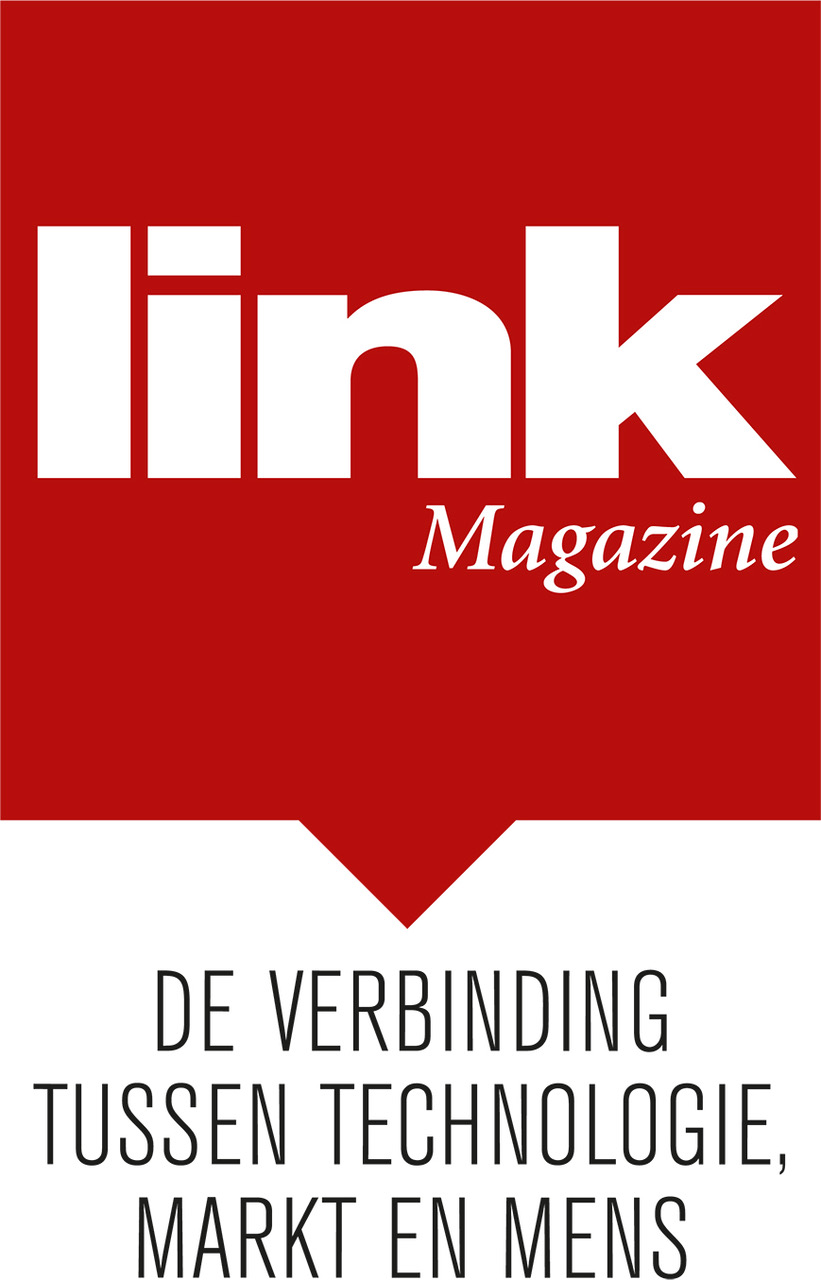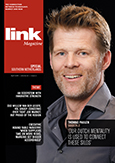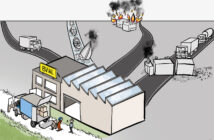The Netherlands excels in co-creation: the high-tech ecosystem Brainport Industries is a good example of this. But the wind of cooperation on the implementation of Industry 4.0 technology is sweeping across the industry. Spitzencluster it’s OWL (Intelligente Technische Systeme OstWestfalenLippe) is causing a furor in Germany. The networks in the neighbouring countries are doing it their own way. They are achieving special results in both cases.
Spitzencluster it’s OWL and Brainport Industries build on strong networks
Technologienetzwerk it’s OWL has an enormous, joint booth at the Hannover Messe every year. Recruiting companies to participate in the fair is becoming increasingly easier. ‘They sign on spontaneously’, says Günter Korder, Operations Director of it’s OWL Clustermanagement GmbH. ‘Companies and knowledge institutes know that we enjoy tremendous name recognition and visibility. Over the past few year we have garnered a lot of attention from the press, from politicians, and from large companies in and outside the region. Last year, nine Chinese delegations visited our booth on the first day of the Hannover Messe to learn about what we do.’
Spitzencluster it’s OWL unites over 180 partners: companies, universities and knowledge institutes. Together, they want to make the leap to intelligent systems, to Industry 4.0. This network collaborates on innovative products and services for the market of tomorrow. From automation and drive solutions, machines, vehicles and household appliances to connected production lines and smart grids. Global market leaders and ‘Hidden Champions’.
Competition
It all began about six years ago when the region took part in a Spitzencluster competition organised by the German Ministry of Education and Research. To everyone’s surprise, it’s OWL was chosen as one of the fifteen high-tech top clusters. The relatively small, somewhat unknown, region – compared to the industrial areas around Stuttgart, Hanover and Munich, for example – received no less than 40 million euros for cooperation and development. The core of it’s OWL consists of family businesses. Four hundred companies operating in the machine building, electrical engineering and automotive supply industries provide 80,000 jobs. Well-known names include Benteler, Claas, Hella, Miele and – from industrial electronics – Beckhoff, Harting and Lenze.
‘The region is somewhat atypical’, says Prof. Fred van Houten of the University of Twente, member of the Advisory Board of it’s Owl. ‘Family businesses have a different dynamic than companies where shareholder value and quarterly figures play a dominant role. They want to leave a nicely established business for their children and grandchildren. They foster a cooperation mentality.’ According to a study by the Stockholm School of Economics, OstWestfalenLippe (OWL) is one of the eleven strongest production regions in Europe, with a high innovation performance and export ratio. Günter Korder: ‘There’s a lot of energy here. Not that cooperation is always easy, but what happens here within it’s Owl is very valuable. It makes us stronger. Within Germany, it’s OWL is one of the largest initiatives in the area of Industry 4.0, contributing significantly to the maintenance of the manufacturing industry in Germany.
Technical shopping mall
A while back, seven years ago to be exact, the Coöperatie Brainport Industries was founded in Eindhoven. It is a supply network of over hundred Dutch high-tech companies. It wants to create a linkage between first, second and third tier high-tech companies, further enhance the chain’s professionalism, and increase innovation and competitive power. OEMs in the high mix, low volume and high complexity machine building industry place increasingly more demands on their suppliers. In addition to manufacturing components and (sub)modules, they want their strategic suppliers to also undertake the development and engineering aspects. They must be able to shoulder all of the responsibility for this.
Brainport Industries has members from all over the Netherlands, including AAE The Art of Mechatronics, equipment service provider Frencken, added-value supplier Contour, system supplier NTS-Group, VDL GL Precision and Bosch Rexroth The Drive & Control Company. Edward Voncken, CEO of KMWE, is the chairman. KMWE specialises in High-Mix-Low-Volume-High-Complexity machining and assembly as well as in development and engineering for aerospace and high-tech machine-building.
‘Technical shopping mall’
What makes this venture unique is the industrious construction of the physical variant of ultimate cooperation in the manufacturing industry: Brainport Industries Campus (BIC). ‘A large, covered technical shopping mall’, as Edward Voncken calls it. The campus (ultimately 200 hectares or the equivalent of 400 football fields) is located off the A2 motorway, close to Eindhoven Airport. The initiator of the campus is Brainport Industries in close cooperation with the project developer SDK, the province of Noord-Brabant, the city of Eindhoven and the Brabantse OntwikkelingsMaatschappij. Impressively designed, innovative buildings will literally be in the middle of the green landscape. The heart will be the glass Atrium with catering facilities, technology showrooms, flexible production areas and pavilions for innovation, education and development. High-tech companies in the supply and manufacturing industry will share facilities for their production, storage, logistics, research and innovation needs in the ‘Factory of the Future’, which will be in use 24/7.
Companies will obviously have their own sections. KMWE (with about 500 employees and 85 million euros in turnover) moves its Dutch branches to the Brainport Industries Campus. Per the planning, the first new building can be occupied as of May. KMWE will move all of its branches to the campus in a very phased manner. ‘We want to offer our employees an attractive working environment, which also attracts young people.’
Entire chain under one roof
Some 1600 students from the vocational training courses of Summa Techniek will be taught on campus as of August 2018: The next generation of the high-tech manufacturing industry will be educated at a state-of-the-art work and learning environment. ‘It’s exciting: this new concept of an entire supply chain under one roof still needs to be understood. Fellow companies are sometimes cautious and first want to see if it will work. Other entrepreneurs believe in it and are taking the step to move to the campus.’ KMWE was the first to sign up for it, followed by BT Brammer, Fujitsu Glovia, Anteryon, HTSC, Procurion and Yaskawa Benelux, to name a few. AddLab is also going into production: it is the first Dutch 3D printing factory, founded by eight suppliers who have jointly developed 3D metal printing technology.
Edward Voncken – a graduate of the Rheinisch-Westfälische Technische Hochschule Aachen – saw a lot of interest from abroad. Japanese robot suppliers, for example, want to establish their European base here. German companies, which do business in the Netherlands, but don’t want a static showroom, can show their machines and software in full production to large customers. Voncken: ‘KMWE supplies a great deal to German OEMs. They, too, are outsourcing more and more. They will find an entire network under one roof here. We can utilise the supply chain more intensively.’
Engine
Both at Technologienetzwerk it’s OWL and at Brainport Industries, there are joint projects aimed at the implementation of Industry 4.0 (known as Smart Industry in the Netherlands), the main engine. The new innovation programme, ‘Factory of the Future’, was kicked off in Eindhoven in January. The aim is to jointly develop smart innovation and production facilities and to make them accessible to the entire sector. The programme comprises seven projects with the themes robotics, digital information exchange, multi-material 3D printing, industrial metal printing, high-tech software, engineering vocational training and advanced production logistics. Some 75 companies and 6 educational and knowledge institutes are involved in the programme.
The Brainport Industries Campus also has two field labs that are part of the Dutch Smart Industry Action Agenda. Field lab Flexible Manufacturing is focused on using robots to make production processes more flexible. In another field lab, Smart Connected Supplier Network, we are working on an efficient exchange of information between chain partners by standardising the interfaces of the different systems.
Industry-driven
At it’s OWL, there have been 46 innovation projects implemented with a value of 100 million euros in recent years. Günter Korder: ‘They are industry-driven innovation projects. A company puts a challenge on the table and we look for people from the knowledge institutes and other companies from the entire production chain. Where there may have been bilateral contacts in the past, many of the parties currently work together in an open way.’
In addition, small companies get the opportunity to gain knowledge free of charge at larger companies and knowledge institutes in order to strengthen the entire ecosystem. ‘There are 171 tailor-made projects of no more than half a year. Away from all paper formalities, so that the partners could really concentrate on the content. It brings practical solutions, for example, in the area of digitisation or energy efficiency.’







